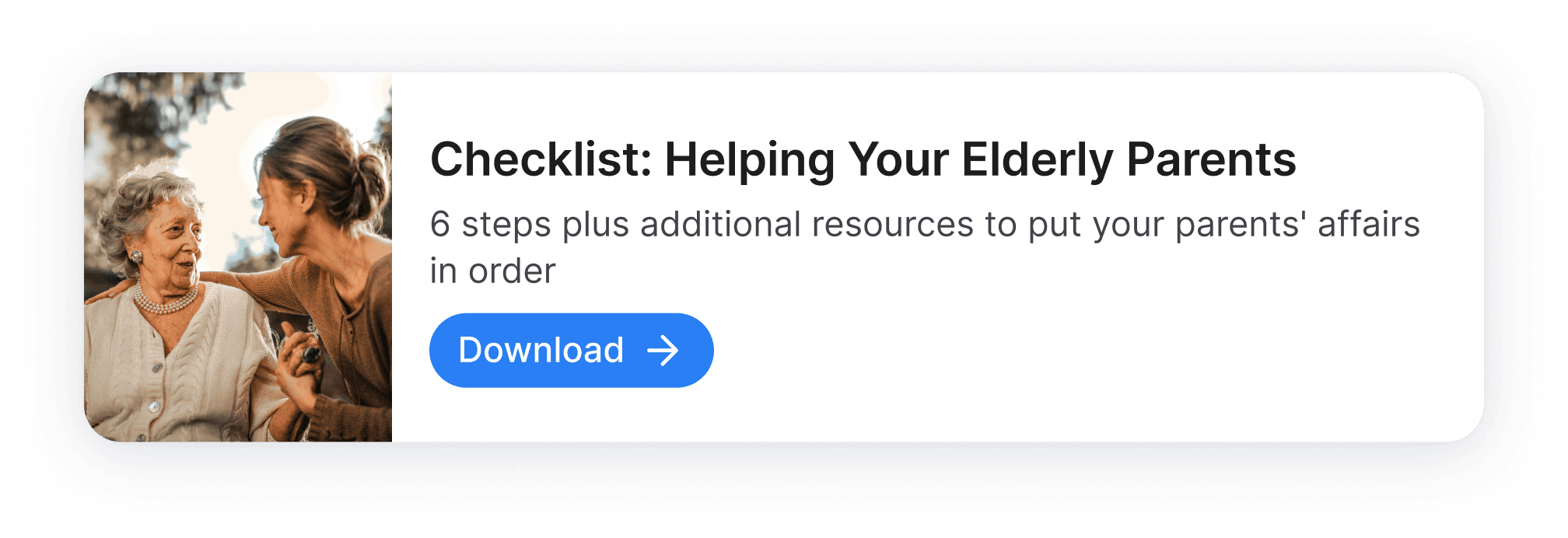As an adult child, taking care of aging parents can be overwhelming, especially if you don't know what to do or where to start. You may struggle to manage your parents' finances, medical care, legal matters, and safety.
In these situations, having an elder care checklist can help you stay organized and ensure your parents receive the best care possible.
In this article, we will provide you with a comprehensive senior care checklist covering what you need to do to care for aging parents.
Key Takeaways
Ensure timely and affordable care by obtaining bank statements, tax returns, medical history, durable power of attorney or healthcare proxies, and living wills.
Identify potential safety risks by assessing the home environment, investing in monitoring technology, and encouraging exercise and medication management. Have emergency phone numbers in place.
Set up a caregiving plan and consider using shared caregiving apps to coordinate family schedules and divide caregiving tasks. You may want to hire a caregiver if round-the-clock care is needed.
Gather Your Parents' Documents
Obtain Financial Information
Having your parents' financial information is crucial to getting timely and affordable care. Seniors applying for certain benefits must demonstrate their financial needs and provide comprehensive documentation of their past and present finances.
One example is Medicaid. Medicaid is a federal and state program that provides healthcare coverage for people with limited resources.
To qualify for Medicaid, seniors must demonstrate their income and assets fall below a monthly threshold that varies by state. Your parents must provide comprehensive documentation of their past and present finances, including bank statements and tax returns. Failure to provide this documentation could result in the denial of benefits or delays in processing their application.
To avoid situations like this, your parents may need your help collecting the following important financial documents:
List of all bank accounts. Contact each bank or financial institution where your parents hold an account and request copies of statements for each account.
Pension documents, 401(k) information, and annuity contracts. Contact each organization where your parents hold a retirement account or annuity and request copies of the account documents.
Tax returns. Contact the Internal Revenue Service and request copies of your parents’ tax returns for the past several years.
Savings bonds, stock certificates, or brokerage accounts. Contact each organization where your loved ones hold investments and request copies of the account documents.
Business partnership and corporate operating agreements. Contact the organization where your parents have a business partnership or corporate interest and request copies of the agreements.
Deeds to all real property. Contact the county or city recorder's office where your loved ones own property and request copies of the deeds.
Vehicle titles. Contact the motor vehicles department in your parents’ state and request copies of the vehicle titles.
Documentation of loans and debts, including all credit accounts. Contact each creditor and request copies of loan and debt documents.
Your next challenge is keeping track of all of that information once you've collected it. One option to consider is using super-secure digital storage like what Trustworthy offers.

Collect Healthcare Documents
Regardless of your parents' current health status, they should state their healthcare preferences in a living will and healthcare proxy.
These advance directives can make sure their wishes and care instructions regarding life support, organ donation, and other medical issues are followed in the event of their incapacity.
When taking an older parent to a hospital, you need to have documented proof establishing yourself as their decision maker, such as through their durable power of attorney or advance directives:
A durable power of attorney is a legal document in which an adult designates someone, usually a family member or friend, to make decisions on their behalf if they cannot make decisions for themselves.
An advance directive is a document that outlines your parents' healthcare wishes and instructions in the event they become unable to make medical decisions for themselves.
To get these documents, you should speak with your parents about their wishes and find out if they have completed the necessary legal forms.
You may need to contact an attorney to help draft the documents or speak with your parents' current attorney to see if they already have them on file.
Having access to your parents' medical history can also be lifesaving during a medical emergency.
Your parents' medical history can provide critical information about their health status, past medical conditions, and current medications. This information can be helpful during a medical emergency, when time is of the essence and healthcare providers need to make quick, informed decisions about a parent's care.
To get your parents' medical history, you can request their medical records from their healthcare providers, including their primary care doctor, specialists, and hospitals.
To access your parents' medical records, you will typically need to provide authorization or written consent from your parents because medical records are considered private and confidential under the Health Insurance Portability and Accountability Act (HIPAA).
Your parents' healthcare provider will have a process for requesting medical records, which may involve filling out a form or providing a written request. In some cases, you may need to prove you are authorized to access your parents' medical records, such as through a durable power of attorney or healthcare proxy.
There may also be fees associated with obtaining copies of your parent's medical records. Healthcare providers can charge a reasonable fee to cover the cost of copying and mailing the records.
Additionally, medical records are necessary for applying for benefits, including veterans' assistance and Medicaid, and when moving to a senior living community.
Make sure to have these records available:
Healthcare proxies or power of attorney. Contact your parents’ attorney or hire an attorney to draft the documents.
Authorization to release healthcare information. Ask your parents' healthcare providers for a release form, and make sure your parents sign and date it.
Living will (healthcare directive). Hire an elder-law attorney to draft the document.
Portable medical order, also known as POLST, for seriously ill or frail seniors. It's obtainable through your parents’ healthcare providers.
Personal medical records. Make a request to your parents’ healthcare providers, with authorization from your parents to access their medical records.
Emergency information plan. Create a plan that includes emergency contact information for your parents' healthcare providers and a list of medications they take.

Obtain Estate Planning Documents
Check whether your elderly parents have up-to-date and easily accessible end-of-life and estate planning documents. Without these documents, your family can be thrown into unnecessary legal and financial chaos during an already difficult time.
Here are some essential end-of-life and estate planning documents to keep track of:
Last will and testament. This document outlines a loved one's wishes about the distribution of their assets after they die.
Trust documents. Living trusts allow a parent to place their assets within the trust.
Life insurance policies. Keep track of any life insurance policies your parents have, as these can provide financial support for their beneficiaries in the future.
If your parents haven't prepared these documents yet, you may need to help draft them, or contact an attorney or the insurance company to help with the process.
Related: Estate Planning for Elderly Parents
Gather Other Documents
There are also other miscellaneous documents you'll need to manage your elderly parents' affairs.
Here's how to obtain some of the most important documents:
Marriage certificates. To obtain a marriage certificate, you must contact the office of vital records in the state or county where the marriage occurred, provide identification, and pay a fee.
Military records. You can request military records from the National Archives and Records Administration online, by mail, or by fax.
Birth certificate. To obtain a birth certificate, contact the office of vital records in the state or county where the parent was born. You may need to provide identification and pay a fee.
Driver's license. To obtain a driver's license, your parent must visit a local department of motor vehicles office and provide identification and proof of residency.
Passport. To obtain a passport, your loved one must complete an application and provide a driver's license or birth certificate. They also need to provide a passport photo and pay a fee.
Guardianship/conservatorship forms. These documents may be obtained from the court where the guardianship or conservatorship was established.
Invest in Safety Measures
As your parents start to age, safety becomes an increasingly important concern. Here are some steps you can take to keep your elderly loved one safe.
Identify Potential Safety Risks
Work with your parents' doctor to identify any physical challenges or health conditions that may put them at risk for accidents or injuries.
For example, if your loved one has mobility issues, you may need to install handrails or grab bars in the bathroom to prevent falls.
Assess Home Safety
Look over your parents' home for safety risks.
You can identify potential hazards such as loose rugs or poor lighting and make the necessary modifications to improve safety.
Invest in Monitoring Technology
There are plenty of technologies available to help keep seniors safe. You can install an alarm or security camera system to alert you if a parent wanders away from home.
A necklace or bracelet with GPS tracking can help you locate a parent if they become lost or disoriented. There are also wearable devices that can detect falls and automatically alert emergency services.
Encourage Regular Movement and Exercise
Regular physical activity can help improve balance and coordination, reducing the risk of falls.
Encourage your parents to participate in activities such as walking or tai chi, or think about enrolling them in exercise classes designed for seniors.
Use Proper Medication Management
Mismanaging medications can be deadly for seniors. Make sure your parents understand how to take their medications and when to take them.
Consider using a pill dispenser with reminders to ensure medications are taken correctly.
Keep Emergency Numbers Handy
Make sure your parent has easy access to emergency phone numbers, such as those for medical aid, poison control and family members.
Post these numbers in a visible location, such as on the refrigerator.
Make a Caregiving Plan
Caring for aging parents requires careful planning and regular communication with family members and medical professionals.
One way to ensure that family members are on the same page is to have a family meeting to discuss caregiving responsibilities. During this meeting, you can discuss each person's strengths and weaknesses and divide caregiving tasks accordingly.
You might also want to put your caregiving responsibilities in writing.
A caregiving contract can outline each person's responsibilities and compensation. A contract can help to clarify expectations and prevent any misunderstandings or disputes down the line.
Another way to avoid confusion is to use a shared caregiving app to help family members coordinate schedules and stay up-to-date on their parents' appointments, medication schedules, and other important tasks:
CareZone allows families to create a shared profile for their loved ones and keep track of medications and appointments. It also has a messaging feature.
Lotsa Helping Hands allows you to create a private community for your family and friends to coordinate caregiving tasks. You can also create a calendar for appointments and tasks.
CaringBridge allows you to create a private website where you can share updates about your loved one's health and progress. You can also use it to coordinate meals, visits, and other tasks.
Trustworthy Certified Experts™: Get Extra Help With Your Parents' Estate Organization
Consider Hiring a Professional Caregiver

If your parent requires round-the-clock care, you can hire a professional caregiver.
Professional caregivers can provide a wide range of services, including assistance with activities of daily living such as bathing, dressing, grooming, medication management, meal preparation, and transportation to appointments.
Hiring a professional caregiver might be beneficial in several ways.
First, professional caregivers are trained and experienced in providing care for seniors and can often provide a higher level of care than family members who may not have the same level of expertise.
Second, hiring a professional caregiver can help reduce the burden on family members who may be providing care.
Finally, hiring a professional caregiver can provide peace of mind for family members who may not be able to be with their loved ones as often as they would like. Knowing that a trained professional is providing care can help to alleviate some of the stress and worry that often comes with caregiving.
Caring for an aging parent can be physically and emotionally exhausting and can take a toll on family relationships. By hiring a professional caregiver, family members can have more time to focus on their own needs and responsibilities while still ensuring that their loved one is well cared for.
If you are considering hiring a professional caregiver for a parent, do your research first and choose a reputable agency. You may also want to involve your parent in the decision-making process so they are comfortable with the caregiver and the care plan.
Think About Pets
If your parents have pets, make sure to discuss what will happen to them if your parents need to move.
You may need to find a new home for the pets or make arrangements for their care with a local animal shelter or rescue organization.
Explore Other Care Options
Research different types of care options, such as in-home care, personal care homes, and senior living communities.
Compare the services and amenities offered by each option to find the best fit for your loved one's needs and preferences:
In-home care. In-home care allows your parent to stay in their own home while receiving assistance with daily tasks such as meal preparation, medication management, and personal hygiene.
Personal care homes. Personal care homes are small, private homes that provide care for seniors who need assistance with daily living activities.
Assisted living communities. Assisted living communities provide seniors with housing, personal care services, and medical support. They offer meals, housekeeping, transportation, and socialization.
Memory care communities. Memory care communities are designed for seniors with dementia. They offer specialized care, including memory-enhancing therapies.
Skilled nursing facilities. Skilled nursing facilities provide round-the-clock medical care and support for seniors with complex medical needs.
Consider factors such as cost, location, staffing ratios, and the quality of care provided. You may also want to schedule tours and meet with staff members to get a better sense of the environment and the level of care provided with each option.
How Trustworthy Keeps Elderly Parents' Important Documents Safe

Trustworthy is a secure online platform that can help keep your elderly parents' important documents safe and secure.
Trustworthy provides cloud storage for important documents such as health care proxies, living wills, financial documents, and other legal documents. By storing these documents securely online, your family can access them from anywhere with an internet connection, and you don't have to worry about losing the physical copies.
Trustworthy uses encryption to protect your parents' documents from unauthorized access. The documents are encrypted into an unreadable format that can only be decrypted with the correct encryption key, protecting them from hackers and other online threats.
With Trustworthy, you can securely share your parents' documents with family members and caregivers. You can control who has access to the documents and what level of access they have. This makes it easier to collaborate on caregiving and legal matters related to your parents.
By using Trustworthy, you can keep your elderly parents' important documents safe, organized, and easily accessible. This can make caregiving and legal matters related to your parents much easier to manage.
We’d love to hear from you! Feel free to email us with any questions, comments, or suggestions for future article topics.
Trustworthy is an online service providing legal forms and information. We are not a law firm and do not provide legal advice.











